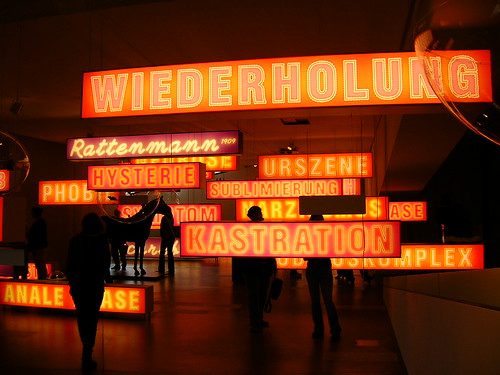 I was reading Wlad Godzich's extremely perceptive introduction to de Man's Blindness and Insight, and happened upon a statement that is both right on and, unfortunately, symptomatic. Godzich is describing with all possible accuracy the sort of writing that de Man produces with respect to the rest of the field of literary studies. While modern literary studies falls back upon the rigor of its methodologies for validity (it conceives the correctness of its results based on the correctness of the procedure that produces these results, more or less self-consciously) as opposed to something like philology proper (which works to establish a text, and has methods that, because their product is more of a product, can be seen as external to the result: the correctness of the result can be more objectively verified, and does not always imply a merit or misstep in the procedure that brings it about)--while modern literary studies, Godzich claims, is engaged in this refinement of its methodology (and he is speaking in such broad strokes here he could be really wrong), de Man tries to immediately call into question the necessity of this falling back upon method in the first place. In other words, for de Man, the issue is not whether a particular method is correct or needs to be replaced with another, whether it succeeds or fails. It is why this issue of the correctness of a method needs to be called up in the first place. Godzich puts it better than I can: de Man is not "a methodologist among others," one who
I was reading Wlad Godzich's extremely perceptive introduction to de Man's Blindness and Insight, and happened upon a statement that is both right on and, unfortunately, symptomatic. Godzich is describing with all possible accuracy the sort of writing that de Man produces with respect to the rest of the field of literary studies. While modern literary studies falls back upon the rigor of its methodologies for validity (it conceives the correctness of its results based on the correctness of the procedure that produces these results, more or less self-consciously) as opposed to something like philology proper (which works to establish a text, and has methods that, because their product is more of a product, can be seen as external to the result: the correctness of the result can be more objectively verified, and does not always imply a merit or misstep in the procedure that brings it about)--while modern literary studies, Godzich claims, is engaged in this refinement of its methodology (and he is speaking in such broad strokes here he could be really wrong), de Man tries to immediately call into question the necessity of this falling back upon method in the first place. In other words, for de Man, the issue is not whether a particular method is correct or needs to be replaced with another, whether it succeeds or fails. It is why this issue of the correctness of a method needs to be called up in the first place. Godzich puts it better than I can: de Man is not "a methodologist among others," one whocan never mount a critique of an approach without, at least implicitly, holding some strong views on what the correct approach should be. Rather, his scrutiny of the critical practice of others... seeks to go beyond an inquiry into the validity, or to speak rapidly, into the success or failure of a given methodology, to an elucidation of the relationship of that methodology to its own necessity. That is, while de Man does not neglect to consider the capacity of a methodology to abide by its own rules and to thus give us knowledge of the text it is applied to, such a consideration is, for him, secondary to the question of why the issue of methodology had to arise in the first place; and to the answer that the given methodology provides to that question, explicitly or not.
-"Caution! Reader at Work!" in Blindness and Insight, xviii-xix.
Insofar as all the presuppositions above about the nature of literary studies were necessary to bring out this aspect of de Man's work (and it is telling that one has to reorganize literary studies around de Man in every effort that you undertake to situate him within it--de Man is both that powerful and the aspects of his work are, indeed, so hard to characterize) I think they are justified and well thought out. For the payoff here is huge: Godzich gets right to the heart of what de Man is up to. It is interesting that many contemporary definitions of theory precisely articulate themselves in these terms: theory is about the conditions of the possibility of any methodological interpretation, is a quick definition to which many have recourse--in contradistinction to being a "methodologist among others," one who just picks up a text and interprets it, applying the method. One can attribute this, I think, to the immense influence of de Man or at least to the power of his formulations--as well as to their ambiguity and their presuppositions. For what becomes clear is that the presuppositions of this statement are not just what has already been stated about the particular methodological concerns of modern literary studies. To characterize what de Man does (and perhaps, by extension, what theory now does) as an inquiry into the necessity of methodologies, one has to admit what Godzich immediately goes on to say:
...While de Man does not neglect to consider the capacity of a methodology to abide by its own rules and to thus give us knowledge of the text it is applied to, such a consideration is, for him, secondary to the question of why the issue of methodology had to arise in the first place; and to the answer that the given methodology provides to that question, explicitly or not. For the practice of any methodological approach can be self-governing, whereas the question of the necessity of methodology raises the issue of what reading is.
-Blindness and Insight, xix (my italics).
This last sentence is what is right on, but also what is completely symptomatic. For it is true that every methodological approach is, in relation to de Man's practice, self-governing. It is even true of theory. But, at the same time, it is only true of these insofar as they themselves conceive of their practice this way and comport themselves as such. In other words, this would be the ideology of theory, rather than anything objectively valid--and the crisis of theory now (or at least since the late 90's) would be (among other things) the result of the dissolution of this ideological formation.
For is it really clear that the practice of any methodological approach can be self-governing? What an amazing, massive presupposition! Can we just go and apply a method, ever? Certainly not after the contribution that theory has made to our studies--in other words, not any more. Every inquiry now very easily, in fact, questions not only its own validity, but also its necessity. If anything, we are enormously, hugely lacking in what should be the more simple issue of validity, of the correctness of our approach to the methodological rules we have set out to engage. This is the harder issue.
But more importantly, it seems that this assumption that any given methodology can be self-governing was precisely what that very anti-theoretical movement called New Historicism precisely tried to deploy and in the process thoroughly (again and again and again, with painful, deadening consistency) proved false. Greenblatt and one or two others remained skeptical about this assumption in their own practice, mostly because for them it was precisely something that could not of itself resist theory (it was an assumption that could only be deployed with theoretical interest: namely, a Foucauldian anti-hermeneutic agenda). But throughout the field (and I speak as a former student with New Historicist proclivities) it was this belief that a methodological approach will govern itself that precisely became the center of the practice and would release you from all the impure concerns that theory or a critical practice of the de Manian type had introduced (this epithet impure still gets thrown around: theory in particular introduced an impurity to the pure study of literature--though theorists themselves, and especially de Man, were often given to saying that theory was a purer study of a purer object). The belief in self-governance manifested itself in the unbelievable fascination with research, with manuscripts, with often badly carried out historical work in the archives--most of all with the production of allegedly buried historical data, a new text, a new document, a new poster, letter, diary, advertisement, etc. etc. etc. that would be able to be run through the methodological machine and produce, besides what was usually a pointless study, an ascetic, self-immolating pride in one's ability to be self-governed, armed as one was with this method. This would proceed to the extent that the belief would (if it was not already doing this from the start) be reaffirmed to the exclusion of the historical data: when it came time to write the article, it usually revolved around setting up the text to be duped by your research, the point being precisely that the text represses its history (!!). But at this point, it is clear that self-governance has been elevated to, precisely, a theoretical point: de Man's formulation of the resistance to or of theory works here more than anywhere else.
The point, however, is not that the New Historicism couldn't oppose what it opposed except dialectically: the point is that its failure was perhaps due precisely to the championing of what theory defined itself against, and that this was some idea that a method can regulate itself unproblematically from the inside (and if this assumption sounds similar to the anti-bureaucratic, anti-government, states-rights or free-market rhetoric that is now being questioned--finally--in America, well, that's no accident). The failure of theory as well of New Historicism, then, would be tied up together in this assumption, the first as a negative, and the second as a positive expression of its falseness.
What if, on the other hand, the practice of every methodological approach precisely implied its own governance from the outside? Not in the sense of being inferior to another discourse, which we see here theory (and then New Historicism) will have already implied is the case. This confuses the subjection of method in terms of importance (again only in terms of the ideology of the overlord--it only claims that it is important or prior) with governance. What is needed, it is clear, is a conception of governance that does not subject but that regulates, in terms of rules and prescriptions, tasks and tests. This will free the sphere of method from both the naive assumption that it can govern itself but, at the same time, not just turn it into its negative, the dependent set of rules that have no force without a richer and more important sphere of analysis to dole them out--which is, in the end, the same thing.













